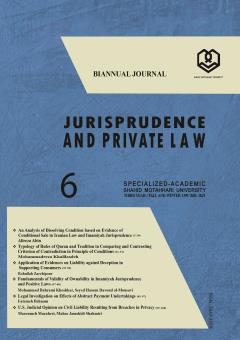-
-
-
Open Access Article
1 - Jurisprudential and Legal Study of Provisos after Cancellation
Seyed Mohammad Hadi Saei Maryam SaqafiCancellation is reached when both parties have consent over the termination of the contract. This means the end of the contract effects and the resulting commitments. This, however, relates to the future; therefore, it is not like nullification of the contract. It does MoreCancellation is reached when both parties have consent over the termination of the contract. This means the end of the contract effects and the resulting commitments. This, however, relates to the future; therefore, it is not like nullification of the contract. It does not have retrospective impact, and consequently it does not affect the pre-cancellation consequences. This point has been neglected by some and in their explanation of rules regarding provisos after cancellation they maintain that all conditions are nullified including attributes, performance and collateral events. Pursuant to this, the Civil Code in Article 246 stipulates that when a contract is terminated by mutual consent, its terms become null and void, whereas rules regarding and effects of each proviso are different and Article 246 shall not be attributable to all of them. This means that the condition of attribute is not within the prerogative of the said article and hence it is not nullified, but also it returns to the initial owner according to the subject of transaction. The condition of collateral events, due to its certain characteristics, is realized immediately after the conclusion of the contract, thus it cannot be nullified or waived either. In the meantime, only the condition of performance, either negative or positive, is nullified due to cancellation although it leaves behind consequences that are analyzable. Manuscript profile -
Open Access Article
2 - A Study of Conceptual Authority in Discerning the Condition of Banning Halal and Authorizing Haram in Imamiya Jurisprudence
Seyed Abolqasem Naqibi Sajjad RazaghiThe condition of banning Halal and authorizing of Haram is one of the most important discussions in Imamiya jurisprudence. Jurists consider the proviso enforceable in case the condition does not ban Halal nor authorize Haram. There is difference of opinion among them on MoreThe condition of banning Halal and authorizing of Haram is one of the most important discussions in Imamiya jurisprudence. Jurists consider the proviso enforceable in case the condition does not ban Halal nor authorize Haram. There is difference of opinion among them on conceptual authority in discerning the condition of banning Halal and authorizing Haram. Some jurists like Sheikh Ansari are of the opinion that the condition leading to authorization of an unchangeable rule on Haram and banning an unchangeable rule on Halal, shall be considered an instance of banning Halal and authorizing of Haram. Some other jurists, like Mohaqeq Yazdi and Nayini believe that the verdicts must first be divided into mandatory and conditional rules before expressing any authorization or banning. In mandatory rules, the late Naraqi – like Sheikh Ansari – only considers commitment to unchangeable rules (Wajib or religiously obligatory act and Haram or religiously forbidden) against the Book and Sunnah or tradition, however, commitment to act or avoid to act in permissible rules is allowed. Also, he says any change in conditional rules by setting a condition is against the Sharia law. Some other jurists, like Imam Khomeini, have resorted to the common law in expressing the quality of authority in its discernment. Manuscript profile
List of Articles proviso
-
The rights to this website are owned by the Raimag Press Management System.
Copyright © 2017-2024


